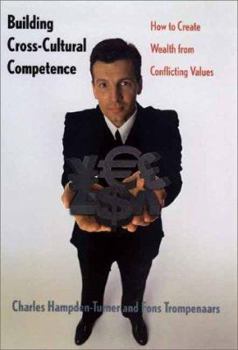Building Cross-Cultural Competence: How to Create Wealth from Conflicting Values
Select Format
Select Condition 
Book Overview
Cross-cultural competence is a skill that has become increasingly essential for the managers in multinational companies. For other business people, this kind of competence may spell the difference between surviving and perishing in the new global economy. This book focuses on the dilemmas of these managers and offers constructive advice on dealing with culture shock and turning it to business advantage. Opposing values can be understood as complementary and reconcilable, say Charles Hampden-Turner and Fons Trompenaars. A manager who concentrates on integrating rather than polarizing values will make much better business decisions. Furthermore, the authors show, wealth is actually created by reconciling values-in-conflict. Based on fourteen years of research involving nearly 50,000 managerial respondents and on the authors' extensive experience in international business, the book compares American cultural values to those of more than forty other nations. It explores six culture-defining dimensions and their reverse images (universalism-particularism, individualism-communitarianism, specificity-diffusion, achieved status-ascribed status, inner direction-outer direction, and sequential time-synchronous time) and discusses them as alternative ways of coping with life's--and business's--exigencies. With humor, cartoons, and an array of business examples, the authors demonstrate how the reconciliation of cultural differences can cause whole organizations to grow healthier, wealthier, and wiser.
Format:Hardcover
Language:English
ISBN:0300084978
ISBN13:9780300084979
Release Date:October 2000
Publisher:Yale University Press
Length:400 Pages
Weight:1.85 lbs.
Dimensions:1.3" x 6.4" x 9.6"
Customer Reviews
3 ratings
An good introduction to Cultural Dimensions
Published by Thriftbooks.com User , 19 years ago
Building and expanding on Hofstede's five dimensions of culture, Trompenaars and Hampden-Turner present a model of culture and cultural differences that is both sensible and eminently useful. While Hofstede may be the man who pioneered cultural research in management, Trompenaars and Hampden-Turner are the men who popularized it within the business world. The six dimensions of culture proposed are simple to understand and relate to. With the numerous examples given throughout the book, cultural encounters suddenly make sense and previously taken for granted 'issues', annoyances, and differences when dealing with other cultures are explained and analyzed. While some of the six dimensions introduced are in some ways similar to Hofstede's, five cultural dimensions (for example individualism vs. communitarism); however, the authors also introduce additional dimensions and sometimes expand Hofstede's in ways that make it easier for the reader to understand the differences among cultures. While many scholars claim that the authors' research is not rigorously scientific as that of Hofstede for example, however, it remains a landmark in the field of culture research in management. Perhaps more importantly, it is more accessible to managers and trainers due to the simplicity of the writing style and the numerous examples scattered throughout the book. Overall, a highly readable and useful book that should become essential reading for students of International Business. For people in a hurry and looking for a 'tool box' for dealing with cultural differences; 'Riding the Waves of Culture' by the same authors may be a better option.
A Good Read!
Published by Thriftbooks.com User , 23 years ago
Don't be put off by this book's daunting terminology. Beneath the author's unrestrained use of labels like universalism, particularism, individualism, communitarianism, specificity and diffuseness, lies an insightful analysis of cultural differences. After defining various nationalities under a host of polysyllabic headings, authors Charles M. Hampden-Turner and Fons Trompenaars illustrate the differences between them using engaging and easy-to-understand scenarios and stories from popular culture. The end goal of each of these sections is to explain to international business managers how cultural dilemmas can be reconciled.
A must read for multicultural managers
Published by Thriftbooks.com User , 24 years ago
I have read this book 3 times only to find that the book is rich of information on how we can do business internationally. I am impressed by the comprehensiveness of the writers' survey which covers more than 40 thousand respondents from 50 different countries. The book also gives me new insights on how people of different values, norms and belief can reconcile the inherent cultural differences to build a dynamic relationship whithin a culturally diversed organisation. I recommend this book for managers and everybody who work in multinational business.






